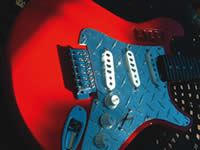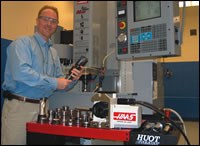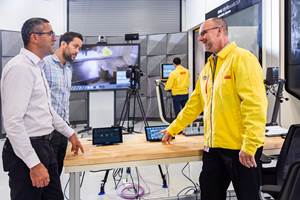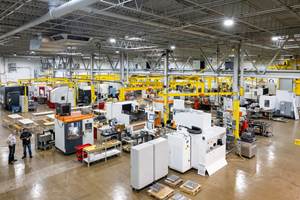Macomb Community College: Smooth Sailing
After experiencing some rough seas, this program is back on course with modernized equipment and an upgraded curriculum.
The 25-year old moldmaking program at Macomb Community College (Warren, MI) got in a bit of hot water last year due to the poor economy and obsolete equipment. Luckily, professor Gary Walters realized the program was drowning and sought the assistance of Haas Automation Inc. (Oxnard, CA)—which helped take the program to the next level in less than a year’s time. Not only has the program’s registration doubled, but all aspects of the program are progressing swimmingly.
Walters explains that the past five years have been full of changes. “Companies became leaner and the demand for CNC greater,” he notes. He sought out the assistance of Bob Skodzinsky, president of Gerotech Inc. (Flat Rock, MI)—a Haas factory outlet—who helped Walters replace the college’s old CNC machines with seven Haas CNC machines, one RAM EDM, one fast-hole EDM, and rapid prototyping and reverse engineering equipment. In addition, Skodzinsky put the school back on track with his Haas Technical Education Center (HTEC) and entrustment program—an industry-sponsored partnership program featuring a technical center.
“Everyone is once again excited about our program!” Walters enthuses. “We’re hosting events on a regular basis and employers and high schools are pleasantly surprised with our training capabilities. And because of this, I’m working more aggressively with local high schools and vocational schools to articulate their graduates into our program and ready them for positions in the wonderful world of high-tech manufacture.”
Navigating Rough Waters
As enrollment figures declined, Walters met with Skodzinsky in 2004 to see what Haas and Gerotech could offer Macomb. Skodzinsky came back with the HTEC offer. “The timing was perfect,” Walters recalls. “Bob was interested in starting an HTEC in Macomb County—given the concentration of machining related companies. With a commitment from the college, Haas Automation would entrust CNC machines for use in education and demonstration. These machines would be the larger types that colleges could rarely afford to purchase.”
That was the start of a beautiful yet prosperous business relationship. Walters developed a new program entitled Advanced Processes, housed under the Applied Technology umbrella (ATAP). Fourteen new courses were developed, accompanied by the procurement of the following equipment (in addition to the entrusted machines):
- Haas CNC mini mill
- Haas CNC toolroom mill TM1
- Haas CNC SL20 turning center
- Haas CNC toolroom lathe TL1
- Dimension rapid prototyping and reverse engineering equipment
- Belmont CNC RAM EDM
- Immersive CNC simulation software
- Cimatron, MasterCAM and ArtCAM
“The new courses were developed after a thorough evaluation of the needs of the community,” Walters states. “To be employable in Southeastern Michigan , a place where thousands of jobs were lost to foreign competition, employees must be both sharp and versatile. The days of one man to one machine are gone forever. Workers in a manufacturing setting must program, set up and operate, EDM burn, and monitor multiples machines and processes. They must do whatever it takes to get the job done faster than ever before possible. They can do this today by upgrading their skills and working with state-of-the-art equipment and technology. The machines today are capable of producing parts faster than what most people know how to use them. We have a great combination of technologies that allow us to exceed expectations—such as faster and more reliable computers, faster machine tools, improved cutting tools, balanced holders, fixtures, coolants and software to drive them.”
Walters prefers using Cimatron CAD/CAM for most of his 3-D mold work, but Macomb also teaches both Cimatron and MasterCAM based on regional preferences. “Cimatron CAD/CAM allows me to design molds, plus program advanced toolpaths using features such as plunge milling and high-speed machining,” Walters states. “It’s important to have total control of the job when programming feedrates in excess of 1000 ipm! But for the detail work, we can program jobs right on the shop floor using Haas’s conversational programming language or manually G&M code programming.”
Charting a New Course
According to Walters, this program has evolved into a program like no other in the United States. “The Macomb program serves both student and industry within the local area,” he states. “HTECs act as a showcase for product demonstrations, as well as training and education. They also attract a pool of related business partners. For example, Iscar Metals donated a significant amount of tools and holders to our college because they want to be a part of this synergy. Rick Steinard, an Iscar applications engineer, actually became an adjunct professor to teach courses in how to select tools and calculate spindle speeds and feedrates for high-speed machining.” Walters felt this class was necessary because there is largely a lack of understanding on how to program HSM toolpaths. "Rick teaches how to maximize your potential by taking advantage of advanced tool geometry and adjusting for radial chip thinning. He demonstrates feeding cutters at 0.100 IPT while maintaining a spindle load less than 100 percent."
The program has been accepted with open arms by faculty and students, Walters reports. “After renovating the facility and rolling in all new equipment, everyone’s eyes were wide open with excitement,” he says. “We felt as though finally we have something attractive to offer students as we help mold and develop their careers. This program has been quite successful in producing qualified candidates for mold-related employment. A considerable number of job postings come our way.”
Another aspect of the program’s evolution has been its development of closer ties with local high schools in an attempt to generate excitement about manufacturing technology in today’s youth. “This is accomplished with articulation agreements and academy programs,” Walters explains. “The academy programs are being developed right now with plans to launch in March through June 2006. They are meant to offer hands-on projects to students interested in technology. Examples include programming and manufacturing solid body electric guitars, remote-control cars, robots, etc.”
All Aboard!
Walters would like Macomb’s enrollment to keep increasing, and plans to start a day program to complement the existing night program. “By working with local high schools we may be able to provide a daytime program that will offer juniors and seniors an opportunity to learn on state-of-the-art equipment,” he notes.
Immediate program goals include continuing to develop qualified candidates for industry and certify students quickly so they can gain or regain employment, Walters notes. For the long term, he’d like to see students graduate with an Associate of Applied Science Degree in Manufacturing Technology.
Walters also plans to continue to build partnerships with high schools for new students seeking careers in this arena as well as grow and maintain this top-notch program—exceeding industry and student expectations. “Macomb is committed to this project for the long haul,” he affirms. “With help from industry partners, college resources, and other sponsors, we will continue to keep our program and its technology up-to-date.”
Related Content
How to Improve Your Current Efficiency Rate
An alternative approach to taking on more EDM-intensive work when technology and personnel investment is not an option.
Read MoreHow to Use Continuing Education to Remain Competitive in Moldmaking
Continued training helps moldmakers make tooling decisions and properly use the latest cutting tool to efficiently machine high-quality molds.
Read MoreCross Training, In-House Capabilities and Collaborative Design Move Helm Tool Forward
Cross-training, bringing it all in-house, molding and collaborative design are essential to Helm Tool's success.
Read MoreUnique Mold Design Apprenticeship Using Untapped Resources
To help fill his mold design skills gap, Jeff Mertz of Anova Innovations, is focused on high schools and underprivileged school districts, a school that has lower graduation and college entrance rates. The goal is a student-run enterprise.
Read MoreRead Next
Education/Training
Industry Experts sound off on the value of training, plus a showcase of apprenticeships and grants.
Read MoreHow to Use Strategic Planning Tools, Data to Manage the Human Side of Business
Q&A with Marion Wells, MMT EAB member and founder of Human Asset Management.
Read MoreHow to Use Continuing Education to Remain Competitive in Moldmaking
Continued training helps moldmakers make tooling decisions and properly use the latest cutting tool to efficiently machine high-quality molds.
Read More























